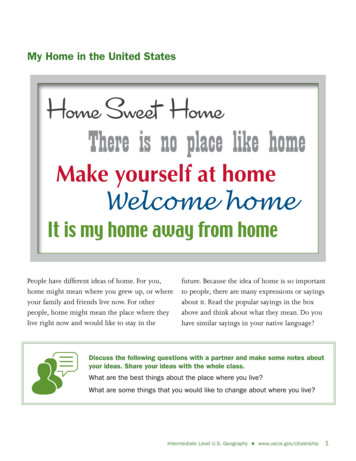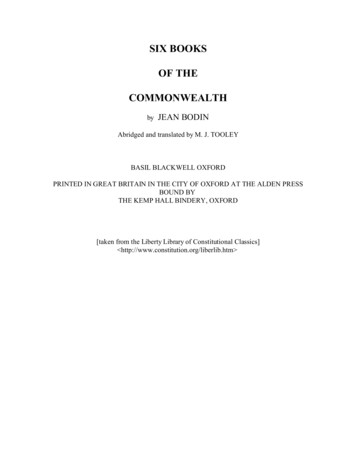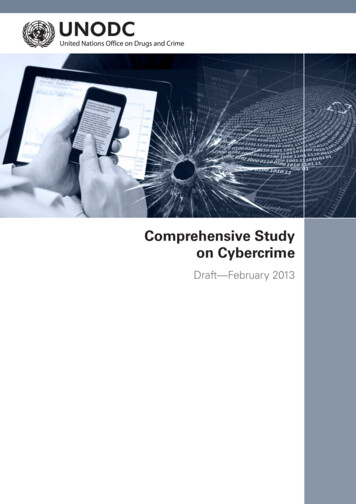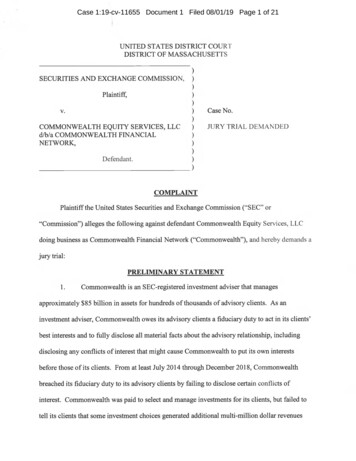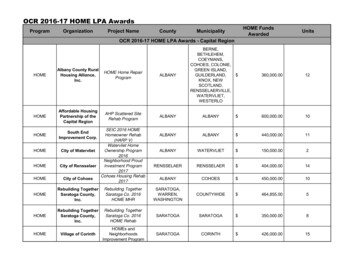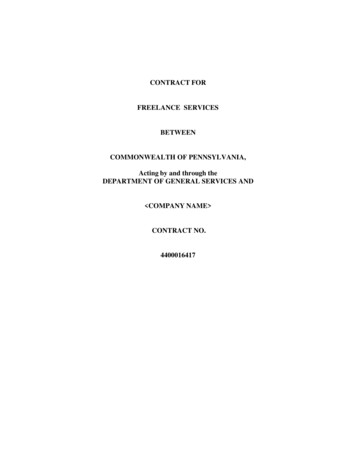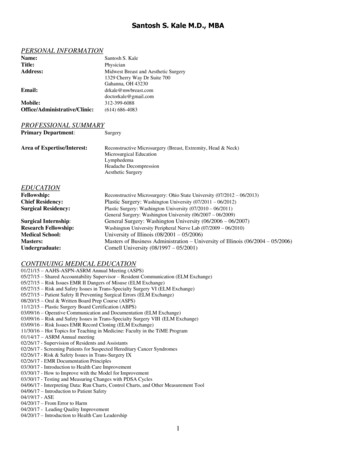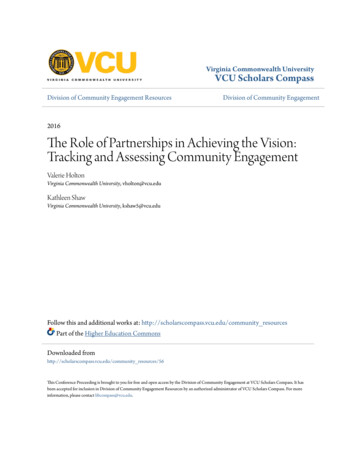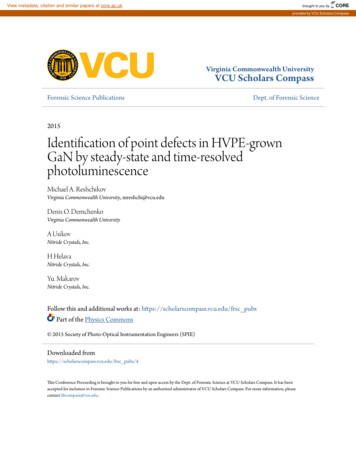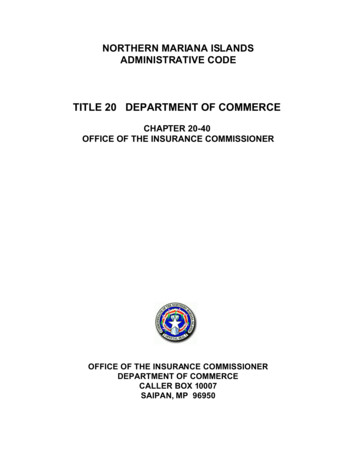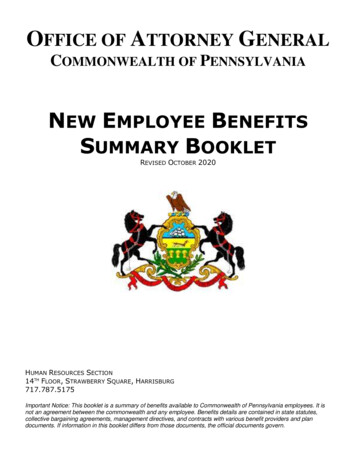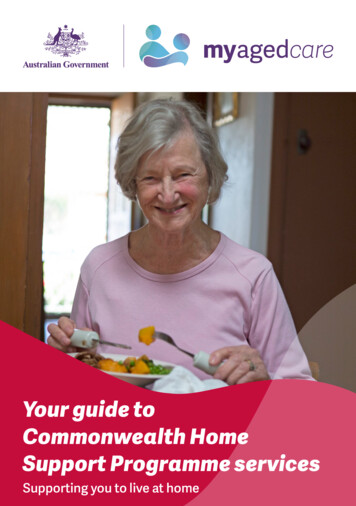
Transcription
Your guide toCommonwealth HomeSupport Programme servicesSupporting you to live at home
ISBN 978-1-76007-320-6With the exception of the Commonwealth Coat of Arms and whereotherwise noted, all material presented in this document is providedunder a Creative Commons Attributions 4.0 .0/au) licence.The details of the relevant licence conditions are available on theCreative Commons website (accessible using the links provided),as is the full legal code for the CC BY 4.0 AU /au/legalcode).The document must be attributed as the Department of HealthYour guide to Commonwealth Home Support Programme services.Contact usEnquiries regarding the licence and any use of this document arewelcome at:Communication BranchDepartment of HealthEmail: copyright@health.gov.auYou can find this product at www.myagedcare.gov.auInformation is current as at June 2019.Aboriginal and/or Torres Strait Islander people are advised thatthis brochure may contain images of deceased people.
Your guide toCommonwealth HomeSupport Programme servicesSupporting you to live at home
4
Is this booklet right for you?This booklet explains how older people can receive support in theirhome and daily life through the Commonwealth Home SupportProgramme.You should read this booklet if you have been assessed by aRegional Assessment Service (RAS) for Commonwealth HomeSupport Programme services.Otherwise call My Aged Care on 1800 200 422 or go tomyagedcare.gov.au for information on the assessment processand eligibility for different types of government-funded aged care:Short-term restorative careShort-term care services in the home or residential care settingsfor situations such as restorative care (return to independence).THIS BOOKLETthis bookletEntry-level support at homeOngoing or short-term care and support services through theCommonwealth Home Support Programme including help withhousework, personal care, meals and food preparation, transport,shopping, allied health, social support and planned respite (givingyour carer a break).More complex support at homeFour levels of consumer directed coordinated packages ofservices through the Home Care Packages Program includingpersonal care, support services and nursing, allied health andclinical services.Residential aged carePersonal and nursing care in aged care homes for older peopleunable to live independently in their own homes. This alsoincludes residential respite for short stays in an aged care home.5
ContentsWhat is the Commonwealth Home Support Programme?. 7How do I access Commonwealth Home Support Programmeservices?. 9Call My Aged Care. 10Have a home support assessment. 11Agree on a home support plan.12Select service providers and work out your fees.13Manage your services . 16Further assistance. 196
What is the Commonwealth HomeSupport Programme?Funded by the Australian Government, the Commonwealth Home SupportProgramme provides a range of entry-level aged care services for olderpeople who need assistance to keep living independently at home and intheir community.If you are generally able to manage but just need some help withdaily tasks to continue living at home, Commonwealth Home SupportProgramme services may be right for you.These services might also be suitable if you have had a setback and needsupport for just a short period of time to help you get back on your feet.The Commonwealth Home Support Programme funds a large variety oforganisations (called service providers) across Australia to deliver the careand services to you.The aim of the program is to help older people live as independently aspossible — with a focus on working with you, rather than doing for you.It is about building on your strengths and abilities to help you remain livingindependently and safely at home.The program is for people aged 65 years and over (50 years and over forAboriginal and Torres Strait Islander people).The program also includes support services for prematurely agedpeople on a low income who are 50 years or over (45 years or overfor Aboriginal and Torres Strait Islander people) and are homeless orat risk of homelessness.Call My Aged Care on 1800 200 422or go to www.myagedcare.gov.au7
Examples of Commonwealth Home SupportProgramme servicesThere are different services to help you manage your day-to-day activities.Depending on your needs, you may be eligible to receive:yy transport to appointments and activitiesyy domestic help (e.g. house cleaning, washing clothes)yy personal care (e.g. help with showering or dressing)yy home maintenance (e.g. changing light bulbs, gardening)yy home modifications (e.g. getting a grab rail installed)yy aids and equipment (e.g. bath seat, raised toilet seat, mobility aids)yy meals, help with food preparation and cooking skills, nutrition adviceyy nursing (e.g. managing medication)yy allied health (e.g. podiatry, physiotherapy, occupational therapy)yy social support (e.g. accompanied activities, group excursions)yy respite (care for you while your carer takes a break).8
How do I access Commonwealth HomeSupport Programme services?This booklet outlines the usual pathway for people to accessCommonwealth Home Support Programme services. It includesinformation on what to expect at each stage, as well as informationfor special circumstances and further assistance.11.Call My Aged Care22.Have a home support assessment33.Agree on a home support plan4.4Select service providersand work out your fees56.Manage your servicesCall My Aged Care on 1800 200 422or go to www.myagedcare.gov.au9
Call My Aged CareMy Aged Care has a website (www.myagedcare.gov.au) and contactcentre to give you information about aged care and to help you accessthe services that are right for you.1 Call My Aged CareYou can phone the My Aged Care contact centre on 1800 200 422between 8am and 8pm Monday to Friday and 10am to 2pm on Saturdays.10My Aged Care staff will ask you questions about your current needs andcircumstances so they can refer you to appropriate aged care assessmentservices. They might also create a personalised ‘client record’ for you.Your client record holds information about your needs, the results of anyassessments you have had, plus any aged care services you receive.
If the My Aged Care contact centre refers you for a home supportassessment, a Regional Assessment Service (RAS) assessor will contactyou to arrange a face-to-face assessment in your home.This assessment is provided free of charge.During your home support assessment, the RAS assessor will ask youabout your day-to-day activities, your needs and your preferences — whatyou can do well, what you need some help doing, and what you want tobe able to do.You may wish to have a family member, friend or carer at theassessment to support you, or to speak on your behalf.2 Have a home support assessmentHave a home support assessmentIf your assessment shows you are eligible for services under theCommonwealth Home Support Programme, you can work with theRAS assessor to decide which service provider(s) you want to receiveservices from.If you have concerns about your home support assessment, try to speakto your RAS assessor in the first instance — it might be possible to get aresolution that way. The RAS organisations have complaint procedures inplace and will work with you to address your concerns. If you and the RASassessor cannot resolve the issue or you feel uncomfortable approachingthem directly, you can call My Aged Care.Call My Aged Care on 1800 200 422or go to www.myagedcare.gov.au11
Agree on a home support planThe RAS assessor will work with you to develop a personalised homesupport plan.3 Agree on a home support planYour home support plan will be tailored to your needs, and will bedeveloped to maximise your independence and quality of life.12Your RAS assessor might also suggest options for you that are not partof the Commonwealth Home Support Programme (e.g. local communityservices, groups and activities).For example, your home support plan might include advice or referralsabout:yy assistive devices or equipment to help you stay independent andsafe in your homeyy meals and food preparationyy transport to appointments, groups and activities to keep youconnected with friends, services and the local communityyy an exercise and/or daily activity programyy strategies to reduce falls.Your home support plan should be reviewed by your service providerevery 12 months, to ensure you are receiving services and supports thatcontinue to be right for you.
Select service providers and work outyour feesYour RAS assessor can arrange to have a ‘referral for service’ sent tothe relevant provider(s) in your local area. A referral for service notifiesproviders there is a new client wanting a service, and prompts them tocontact you to make arrangements.If you first want to visit or call a service provider to decide if their servicesare right for you, ask your RAS assessor to give you a ‘referral code’.You can pass this to the service provider when you speak with them.This allows them to view your client record, accept the referral and startorganising services for you, if you choose to accept their services.If there are no services available, you may be placed on a waitlist. Onceservices become available, people on the waitlist with the highest level ofneed will be offered services first.Call My Aged Care on 1800 200 422or go to www.myagedcare.gov.au4 Select service providers and work out your feesTo find out which service providers offer what you need in your area, askyour RAS assessor or call My Aged Care. You can also use the My AgedCare website to search for providers.13
Work out your fees4 Select service providers and work out your feesIt is expected that you will contribute towards the cost of the services youreceive, if you can afford to do so.You will not be asked to cover the full cost of services — the AustralianGovernment subsidises Commonwealth Home Support Programmeservice providers so that client fees can be kept to a reasonable andaffordable level.Any fees you are asked to pay will be agreed between you and the serviceprovider before you start receiving services.How are your fees worked out?Each service provider is required to have their own client contributionpolicy and will use it to determine your fees. Service providers areexpected to make their client contribution policy publicly available. You canask your service provider to give you a copy of theirs.To work out your fees, your service provider will consider the informationyou supplied during your home support assessment (with the RASassessor) and may ask you questions about your financial situation. Theywill take into account your ability to pay and the number and type ofservices you are seeking.When do you find out what you’re expected to pay?Service providers should discuss and agree contribution amounts with youbefore you start receiving services.What if you can’t afford the fees?Talk to your service provider about the services you will receive and howmuch you’ll be asked to contribute for each of them. Arrangements forclients who are unable to pay the requested contribution will be discussedbefore any services begin.You will not be denied services if you are unable to contribute to the cost.Service providers will have their own arrangements for protecting thoseleast able to contribute towards the cost of their care.14
You have a right to appeal the amount you have been asked to pay. If youwish to question your fees, you should first discuss this with your serviceprovider.Your age pension will not be affected by the contributions you maketowards the cost of your services.Where can you get financial informationand education?You can get basic information about managing your finances from theAustralian Government Department of Human Services (DHS) FinancialInformation Service. This free confidential service can help you makeinformed decisions about your finances for your current and future needs.For more information about the Financial Information Service, call DHSon 132 300 and say “Financial Information Service” when prompted.Call My Aged Care on 1800 200 422or go to www.myagedcare.gov.au4 Select service providers and work out your feesWill your contribution affect your age pension?15
Manage your servicesWhat can you expect from service providers?Commonwealth Home Support Programme service providersshould support you to do as much as you can and help improveyour quality of life.5 Manage your servicesThey will help you to live as independently as possible by focusingon your needs and preferences and building on your strengths.They should provide services tailored to your unique circumstances,working in partnership with you, your family, friends and carers.Service providers should review your services every 12 months tomake sure they continue to meet your needs.What happens if your care needs change?If your needs change over time, you can discuss this with your serviceprovider. They may refer you to My Aged Care for another assessment.You can also call My Aged Care directly to discuss your changingcare needs.If your care needs increase or become more complex, you may need newservices or a different type of aged care, such as a Home Care Package.Call My Aged Care to arrange an appropriate assessment, either with aRegional Assessment Service (RAS) or with an Aged Care AssessmentTeam (ACAT). Once there’s a clear picture of what your new needs are,you will be given options about the care and services best suited to you.Can you change providers? What if you move toanother location?You should talk to your service provider(s) in the first instance, who willrefer you back to My Aged Care. You can also choose to contact My AgedCare directly to talk about your needs. Depending on your circumstances,you may be required to have another assessment.16
What happens if you go into hospital?Speak to your Commonwealth Home Support Programme serviceprovider(s) to let them know, so your services can be suspended whileyou’re away from home.You may be able to receive additional Commonwealth Home SupportProgramme services for a short period of time to help you get back onyour feet after you return home. Speak to your service provider(s) in thefirst instance.You might also be eligible for transition care, which is short-term supportfor older people after a hospital stay. To access transition care services,you must be assessed by an Aged Care Assessment Team (ACAT) whileyou are still in hospital. The ACAT will work out if you will benefit fromtransition care and explain your options to you. To arrange an assessment,talk to the hospital staff or call My Aged Care.5 Manage your servicesIf your needs have changed significantly, your services might need tochange as well. Or perhaps another type of aged care might now bemore appropriate. You might need another assessment to find out whatis best for you and to make sure all your needs are being met. YourCommonwealth Home Support Programme service provider mightrequest an assessment for you or you can call My Aged Care directlyto find out more.What are your legal rights and responsibilities?The Charter of Aged Care Rights sets out your rights as aclient receiving Commonwealth-funded aged care services.Your Commonwealth Home Support Programme serviceprovider should give you a copy of the charter.For help understanding your rights and responsibilities,speak to your service provider in the first instance.Call My Aged Care on 1800 200 422or go to www.myagedcare.gov.au17
Raising your concernsConcerns about the services you are receivingIf you have a problem with a service, try to talk with your service providerfirst. It may be something that can be resolved easily.5 Manage your servicesYour service provider should tell you about their internal complaintshandling process and how to make a complaint. You have the right tomake a complaint without it affecting your care and services.Sometimes complaints cannot be resolved by the service provider, or youmight not feel comfortable raising your concern with them.Another way to raise your concerns or make a complaintYou are also able to make a complaint to the Aged Care Quality andSafety Commission (a free service) in the following ways:yy website — www.agedcarequality.gov.auyy telephone — call 1800 951 822yy in writing — address your written complaint to:Aged Care Quality and Safety CommissionGPO Box 9819[Your capital city] [Your state/territory]Getting help from an advocate (someone who can help you raiseyour concerns)If you want help to raise your concern, you can have an advocate workwith you to resolve the matter. The Older Persons Advocacy Network(OPAN) helps people access and interact with Commonwealth-fundedaged care services. OPAN is funded by the Australian Government.It is free, independent and confidential. OPAN helps older people getthe information they need to make decisions, understand their agedcare rights, and resolve problems and confusion. OPAN can becontacted on 1800 700 600 from 9:30am to 4:30pm Monday to Friday.18
Further assistanceWhat if you need assistance with interpreting?If you speak a language other than English, you can call the Translatingand Interpreting Service (TIS National) for the cost of a local call on 131450. TIS National covers more than 100 languages. Tell the operator thelanguage you speak and ask them to call My Aged Care on 1800 200 422.What if you need assistance due to hearing or speechdifficulties?You can contact My Aged Care through the National Relay Service (NRS).Select your preferred access option at www.communications.gov.au/accesshub/nrs and ask for 1800 200 422.What help is available for people with dementia?The Australian Government expects all aged care providers to offerservices that meet the needs of people with dementia.The Australian Government funds advisory services, education andtraining, support programs and other services for people with dementia,their families and carers. Commonwealth Home Support Programmeclients can access these supports.For more information call My Aged Care on 1800 200 422 or go to www.myagedcare.gov.auWhat help is available for older people who arehomeless or at risk of becoming homeless?If you are prematurely aged, on a low income, are 50 years or over(45 years or over for Aboriginal and Torres Strait Islander people) andare homeless or at risk of homelessness, there are supports including:yy links to appropriate housing and care servicesyy advocacy and assistance with financial and legal workyy links to other social support services aimed at reducing homelessness.Call My Aged Care on 1800 200 422or go to www.myagedcare.gov.au19
What help is available for people with diverse needs?The Australian Government recognises that our society is diverse andpeople have a wide range of life experiences.Many programs and services are available to support people with diverseneeds to access the help they need. Specialised services may exist in yourarea that cater specifically to special needs groups. You can find out morethrough My Aged Care or by asking your RAS assessor.Service providers should consider, respect and support specific anddiverse needs when delivering care and services. No service providershould discriminate against anyone, including:yy Aboriginal and Torres Strait Islander peoplesyy people from culturally and linguistically diverse backgroundsyy people who live in a rural and remote areayy people who are financially or socially disadvantagedyy veteransyy people who are homeless or at risk of becoming homelessyy people who are lesbian, gay, bisexual, transgender or intersexyy people who are Care Leavers (adults who spent time in institutionalcare as a child)yy parents separated from their children by forced adoption or removal.For more information call My Aged Care on 1800 200 422 or go towww.myagedcare.gov.au20
What assistance is available for your carer?If your carer is in need of additional support, contact the Carer Gatewayon 1800 422 737 or go to the website at www.carergateway.gov.au tofind out more.Call costsPhone numbers beginning with 13 or 1300 – Calls to numbersbeginning with 13 or 1300 are charged at the cost of a local callwhen using a fixed landline. If using a mobile phone, call chargesmay be higher – check with your mobile phone provider.Phone numbers beginning with 1800 – Calls to 1800 numbers arefree from fixed landlines. Most Australian mobile phone providers offerfree calls to 1800 numbers – check with your mobile phone provider.Call My Aged Care on 1800 200 422or go to www.myagedcare.gov.au21
Notes22
NotesCall My Aged Care on 1800 200 422or go to www.myagedcare.gov.au23
12472 June 2019For help visit www.myagedcare.gov.au or phone 1800 200 422All information in this publication is correct as at June 201924
You can phone the My Aged Care contact centre on 1800 200 422 between 8am and 8pm Monday to Friday and 10am to 2pm on Saturdays. My Aged Care staff will ask you questions about your current needs and circumstances so they can refer you to appropriate aged care assessment services. They might also create a personalised 'client record' for you.
